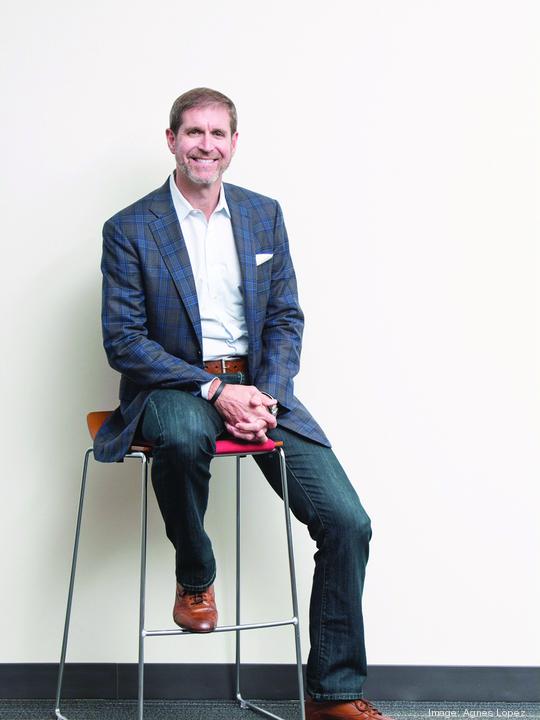
Over the past 20 years, Jacksonville-based Availity has grown to be a giant in the health care technology space. The company, which connects heath care providers with payers, processes 12 billion transactions a year for some 2 million providers.
The company was founded as a joint venture by Florida Blue and Humana. Over the next two decades, it grow both organically and through acquisitions, adding new services and customer types as it grew, including expanding internationally in 2016.
As well as having some of the nation’s largest health care plans as owners, Availity is partially owned by Novo Holdings, an investment fund that bought it stake in the company about three months ago.
That deal, according to private equity trade publication PEHub, was for 18% of the company and valued Availity between $1.7 billion and $1.8 billion.
As the company embarks on its third decade, we sat down with CEO Russ Thomas to discuss the company’s growth, how it managed through Covid and what’s on the horizon. Thomas joined the company in 2008 and was named its second CEO after founder Julie Klapstein in 2011.
What has the past year been like for the company?
We’ve had a good year. 2021 is shaping up to be the best year ever. And 2020 — through all of it’s challenges with Covid — was a pretty good year for us. We’re looking forward to rounding out the year and closing the year pretty successfully.
Availity is a big player in the health care technology space — and technology has changed a lot since the company as founded 20 years ago. How has Availity managed to deal with all that change?
I joke sometimes that Availity is a test of whether you're a pessimist or an optimist. If you're a pessimist, you would look back to our tagline in 2001 — we said patients, not paperwork — and you would look at the modern ”health care system” and realize that there's still a tremendous amount of paper. Paper in our world translates to inefficiency and waste and things that aren't typically good. So although I think we've done a great job of removing a tremendous amount of abrasion and friction and cost from the system, it's still a sector of the economy that is that is extremely inefficient.
If you're an optimist, which I am unabashedly all day, every day, you'd look at the fact that over 20 years, we've built the largest network in all of health care and found ways to leverage technology and build a incredibly robust platform for digital engagement between providers and health plans that today is transacting over 13 billion electronic transactions every year through our network. And you know, each one of those transactions represents some little piece of efficiency that has been gained over the last 20 years.
What has been the secret to your growth?
One, I think is that we have been pretty good at staying focused on what we think of as our North Star, which is really about creating a transparent relationship between health plans providers, so that they can do business with each other more efficiently. It's a sector of the economy, that's pretty inefficient … so we have more opportunity than we know what to do with. I think we're just in a really, really good place from a sector perspective to be impactful and making health care a little bit better and get paid to do that.
Secondly, the thing that we've always done well is attracting very strong leaders to the company. We’ve never forgotten that we need to be innovative and really sort of operate like a small company. And I think that's helped us really attract people who are mission driven into our organization.
The past two years have been a time of change across the economy, particularly with working remotely: People have gotten more comfortable with the idea that you don’t need to be in an office handling someone a piece of paper. How did you move to capitalize on the changes you were seeing with your customers?
Covid was a terrible situation. You can either sort of sat back and worry about it or you can say, look, what are the opportunities for us to be successful, and to change the dynamic of our company during this difficult situation. And we took a real hard look at our strategies. In the middle of the pandemic last year, we took six months and did a complete strategy refresh from the ground up. Our investors put their foot on the gas in terms of accelerating new product technology and our go-to market approach. We hired 125 people in the middle of the pandemic last year.
We looked ahead and said, you know, a healthcare is not going away, even though we saw significant reductions in the utilization of health care. We really believed it was going to come back right and be as strong or stronger than ever, and wanted to be in a really, really good position when we got there.
What surprised you as you went through that strategic review?
I guess maybe the thing that surprised me was the scope of the opportunity that we still have as a company. Because you can look at our business and say, Well, you've penetrated 75% or 80% of all the providers in the country and most of the health plans in the country; you can look at our addressable market for the services that we have today and conclude that it's going to be hard to maintain the double digit growth rate in the business.
What we saw when we dug into the strategy was given where we sit with our customers — we have incredibly high net promoter scores as a company; I'm talking 80s, and 90s, which is kind of unheard off, quite frankly — what that told us is that we had permission to win more business with our customer base. They like doing business with us; if we can develop or acquire products and services that are aligned with our North Star, then we should be able to successfully upsell those into our customer base. So we built a model around a handful of strategic priorities that are very much driven by organic growth
So what are you aiming for in the future? Are there particular things you plan on doing — particular technology you're going to roll out or acquisitions you're going to make?
Absolutely. So health care still operates in a very analog world, right? In our world, what that means is we wait for a provider to ask us a question before seeking the answer. For us, the evolution of our network and our platform has to move from an analog experience to a patient experience from the providers perspective. Let's make sure that when you walk into the door of your physician's office, and frankly, even before you walk in, that we know exactly what the provider needs to know, we share that information with him about you. So that you can really have a healthcare experience with your provider, not an administrative or financial experience with your provider. …
That is it's easy to say, but the kind of technology that's required to do that, from a data management perspective, from a machine learning and analytics perspective, to be able to look at your profile, look at the Florida Blue rules and look at who that provider is now a function and to be able to know with a high degree of confidence that all of these things, should be facilitated in advance of your encounter — that's a big ticket to be able to do that,
You’re describing making both the patient and the provider experience better.
Yeah, and the cool thing for us, I think there's a business there. There’s hundreds of billions of dollars of just pure unadulterated waste in the system. And so we believe, and our customers are telling us, if we can drive that kind of transparency, and real time communication in our network, then we can get paid incrementally to do that. One thing I'm excited about as a company is were on transaction based model for years, and we moved to subscription based models, but the subscription is tied to a pretty predictable metric. I want to enter into gains share. We should be winning when our clients win and, and losing when our clients lose. If we can't help them be more efficient, then we shouldn't prevail. When we can demonstrate the relevance and be more efficient, we should participate and share that savings, not just some flat subscription amount.
So you’ve talked about the past 20 years. What is the Availity of 20 years from now going to look like?
I hope it looks a lot like it does today. from a cultural perspective. I hope we're continuing to act like a small company, even if we're multibillions of dollars of revenue — that we still have this innovative, entrepreneurial spirit that we possess today.



